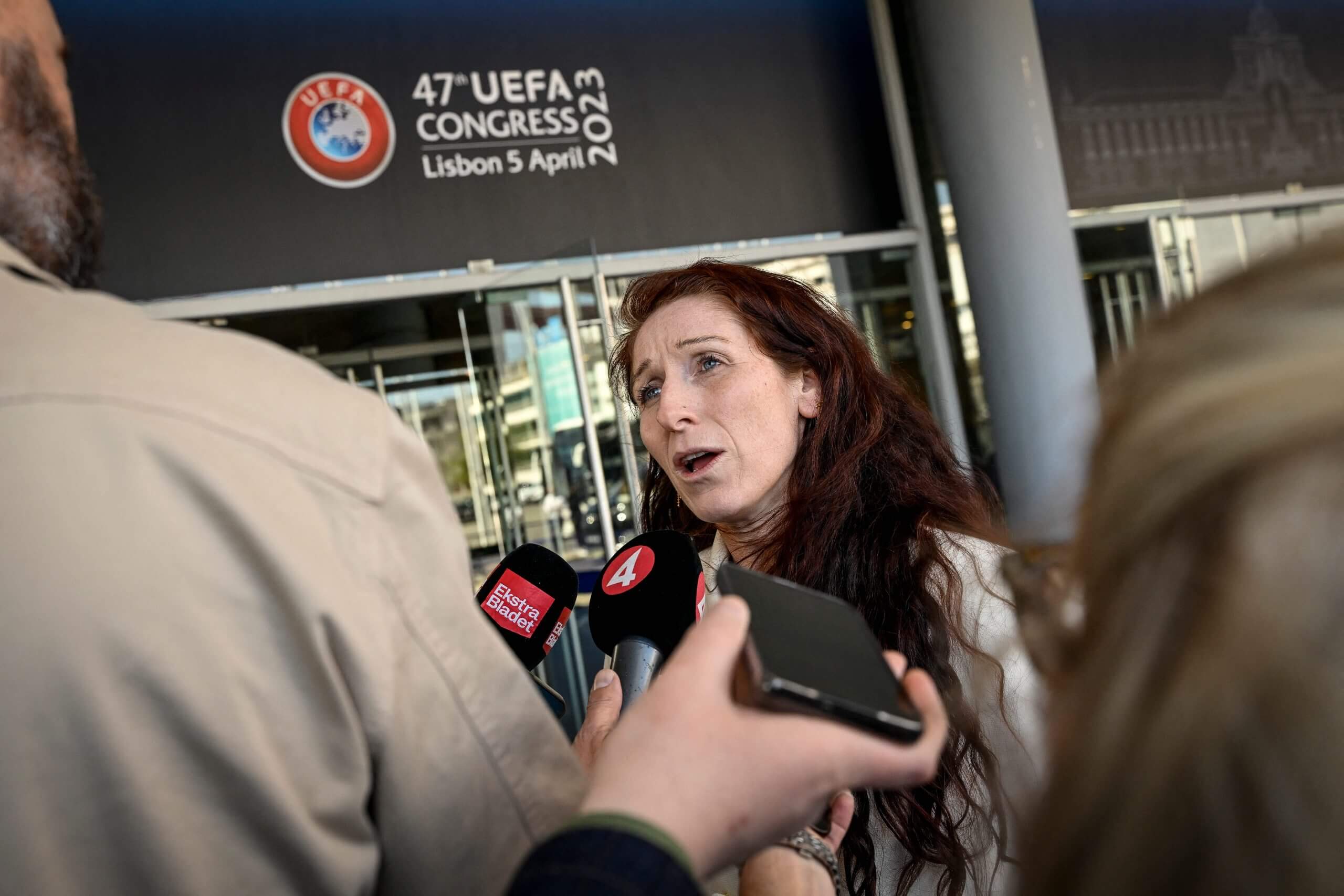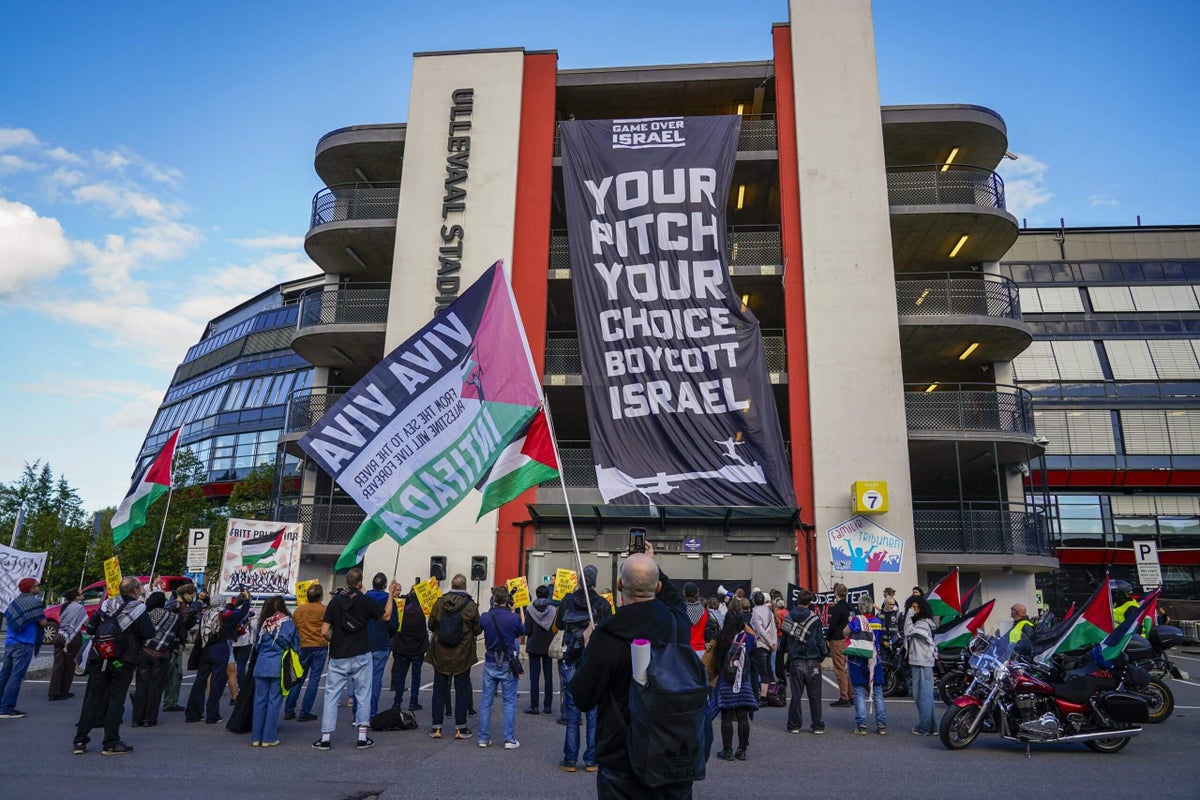Norway can almost reach out and touch men’s World Cup qualification.
Five wins from five sees Stale Solbakken’s free-scoring side, fuelled by the goals of Manchester City striker Erling Haaland, top their group with a flawless record, and the next month could see an end to Norway’s 26-year wait to feature in a major tournament.
On Saturday, Norway could take another step towards the 2026 World Cup in the United States, Canada and Mexico when Israel visit a sold-out Ullevaal Stadium in Oslo. The hosts can guarantee at least a qualification play-off should they maintain their 100 per cent record, moving closer to their first World Cup finals since France 1998.
But the game has been overshadowed by politics, with Norway’s football authorities using the game to make a stance over the ongoing conflict between Israel and Gaza.
All proceeds from the weekend’s game have already been pledged to provide emergency aid in Gaza, with Norwegian Football Federation (NFF) president Lise Klaveness saying in a statement in August that it could not “remain indifferent to the humanitarian suffering”.
Last month, Klaveness — who is also a member of European football’s governing body UEFA’s executive committee — has also said that she believes Israel’s actions in Gaza should have already cost its men’s national football team a place in World Cup qualification, in the same way that Russia has been barred from international football since its invasion of Ukraine in 2022.
“Personally, I believe that since Russia is out, Israel should also be out,” she said on the Norwegian podcast Pop and Politics in September.
That unambiguous take makes Norway and its football association unique. Haaland’s club manager, Pep Guardiola, spoke out about what he called the “live genocide” in Gaza in a video posted on X last week, but while other national organisations may have expressed private discomfort at the prospect of playing Israel and UEFA has come under pressure to ban the country in recent weeks, no federations outside the Palestinian FA have made their feelings as unequivocally known as Norway.
It has created an added layer of tension ahead of Saturday’s match, especially given it falls in the week that marked the second anniversary of the October 7 attacks by Hamas militants on Israel, which saw around 1,200 people, mostly civilians, killed and 250 taken hostage. That Israel and Hamas have agreed the first phase of a Gaza peace plan in the last 48 hours is unlikely to significantly ease that tension.
“There is no doubt that the match against Israel is challenging, given the tragic humanitarian suffering in Gaza and the deep conflicts in the Middle East,” the NFF said in a statement last week.
This is how an international football fixture already meaningful on the pitch for Norway took on a geopolitical significance.
When it comes to thorny issues of football and politics, Norway have long been prepared to stand apart from their European neighbours.
Klaveness, a 44-year-old former lawyer and footballer, was vocal in her misgivings over the decision to play the 2022 World Cup in Qatar, telling the FIFA Congress in March 2022 that the World Cup organisers had ignored issues around “human rights, equality and democracy”. She has also expressed concerns over the bidding process for the 2034 tournament in Saudi Arabia.
Human rights concerns are again at the root of Norway’s problems with Israel.
As the NFF has consistently pointed out, its stance that Israel should be barred from international football is aligned with that of the Norwegian government. Along with Spain and Ireland, they were among the first European nations to recognise a Palestinian state in May 2024, a move that triggered an angry response from Israel.
Eight Norwegian diplomats working in Israel on Palestinian Authority affairs had their accreditation revoked last August, with Israel Katz, Israel’s minister for defence, writing on X that “Norway chose to reward Hamas murderers and rapists by recognising a Palestinian state”.
There has been a complete breakdown in diplomatic relations between Norway and Israel. Pro-Palestinian demonstrations have been common in Oslo, while Norway’s ambassador to Israel, Per Egil Selvaag, had a grenade thrown at his residence in Tel Aviv in June, an act “strongly condemned” by Israeli foreign minister Gideon Sarr.
Norway’s Prime Minister, Jonas Gahr Store, who was re-elected last month, has been an outspoken critic of Israel’s actions in the conflict. “The situation in Gaza is catastrophic,” he told the UN summit last month. “Norway will continue to support the Palestinian government through funds we are mobilising.”
And that, indirectly, has led to money being taken out of Israel. The managers of Norway’s £2trillion sovereign wealth fund, built up from the country’s oil and gas reserves, announced last week that shares in 11 Israeli companies had been sold against a backdrop of what it called a “serious humanitarian crisis” in Gaza.
The NFF has consistently aligned itself with its government’s stance, with Klaveness repeatedly calling for an end to “disproportionate attacks on innocent civilians” in Gaza.
She called a qualification draw against Israel, made last December, “difficult… beyond the purely sporting aspect”, but there was no serious thought given to Norway boycotting games.
With Israel unable to stage matches on home soil, the first qualifying tie between the countries was played in Debrecen, Hungary, in March, with Norway winning 4-2.

Erling Haaland takes on Israel in Hungary in March (Attila Kisbenedek/AFP via Getty Images)
This second meeting, however, comes amid a hardening of attitudes across Europe towards the Israeli response to the October 7 attacks, which has led to approximately 67,000 people being killed in Gaza, according to the Hamas-run health ministry, and widespread devastation in the region.
A United Nations commission of inquiry last month concluded Israel has committed genocide against Palestinians in Gaza, findings that were called “distorted and false” by Israel.
Sport has increasingly found itself part of the debate in recent weeks. On September 29, a coalition of 50 professional athletes, including former Chelsea winger Hakim Ziyech and Crystal Palace midfielder Cheick Doucoure, signed a letter calling on UEFA to suspend Israel from its competitions, following the UN’s own call for Israel to be sanctioned.
Multiple reports circulated that European nations were preparing to hold a vote on Israel’s involvement in World Cup qualifying, but such a vote did not materialise. The suggestions were also met with an emphatic rebuttal by U.S. President Donald Trump’s administration, which made clear it would “absolutely work to fully stop any effort to ban Israel’s soccer team from the World Cup” as it developed a plan to attempt to end the conflict in Gaza.
Norway, all the while, has pointed back towards the Palestinian FA’s proposal tabled at last year’s FIFA Congress calling for sanctions against Israel. The matter was referred to the FIFA Council, but over a year later, there has still been no decision made by football’s global governing body.
Instead, Norway has decided to make its own point this weekend. It was announced last month that ticket sales from the visit of Israel would go to a humanitarian cause helping Palestinian people, and it was subsequently confirmed by the NFF that proceeds would be handed over to Doctors Without Borders, a non-governmental organisation working in Gaza.

Lise Klaveness has been outspoken in her role as head of the Norwegian FA (Patricia De Melo Moreira/AFP via Getty Images)
The gap between announcements, though, brought a spiky response from Israel’s FA, referencing Norway’s controversial practice of whale hunting.
“We do not usually advise associations regarding the use of match revenue, even if it is obtained thanks to a match against our proud national team, but we will deviate from our custom this time,” said Israel’s FA in a statement first released by the Daily Telegraph newspaper in August. “Please, make sure that the money is not transferred to terrorist organisations or to whale hunting.”
It did little to calm tensions ahead of the game. The NFF says “various measures will be implemented to strengthen security before, during and after the match”, which includes a reduction of the Ullevaal Stadium’s capacity by 2,500, to roughly 25,000.
“Like other nations in our World Cup qualifying group, the NFF recognises that Israel is currently part of UEFA/FIFA competitions,” the NFF said. “We are in close dialogue with the police and UEFA to ensure the safe organisation of the match on October 11 for both players and spectators.”
The NFF has issued lengthy guidance and protocols for fans attending Saturday’s game, including details on what will be allowed into the stadium. All flags and banners, the NFF say, must be approved in advance.
“Small Palestinian flags will not be banned,” it added. “But we urge spectators to be respectful and ensure safe match organisation. We primarily encourage fans to bring Norwegian flags and cheer for Norway in this important World Cup qualifier. This is a football match, not a political demonstration.”
Israel can expect an uncomfortable welcome in the opening game of an international break that also includes Tuesday’s trip to Italy, where last week thousands of workers held a general strike in solidarity with a flotilla that was intercepted trying to take humanitarian goods to Gaza.
Ran Ben Shimon, Israel’s head coach, named his squad in the days when doubt hung over Israel’s place in UEFA and FIFA competitions.
“We don’t let environmental noise affect us,” he told reporters when announcing his squad last month. “We understand that we are responsible for the things in our hands.”

